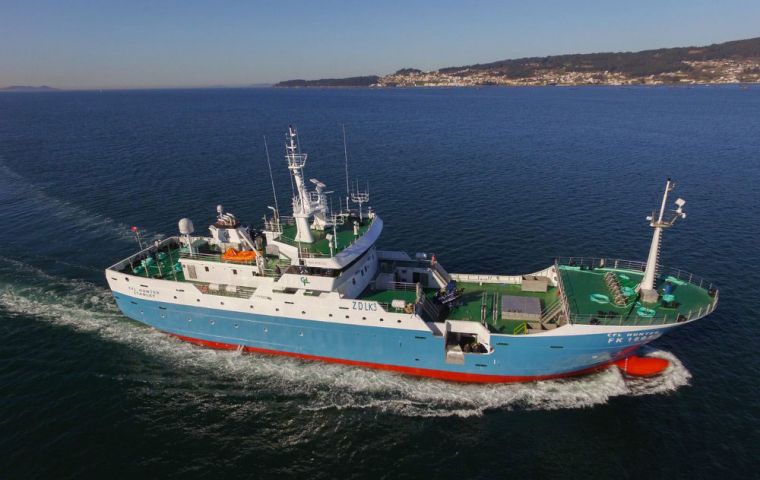MercoPress. South Atlantic News Agency
Falklands' Conservation Zone management could be undermined by unregulated longlining
 The study was supported by Consolidated Fisheries Limited (CFL) and carried out by researchers from SAERI, FIG’s Department of Natural Resources, and the University of Colorado Boulder.
The study was supported by Consolidated Fisheries Limited (CFL) and carried out by researchers from SAERI, FIG’s Department of Natural Resources, and the University of Colorado Boulder. A recent study has found that unregulated longline fishing for Patagonian Toothfish immediately outside the 200-mile Falkland Islands Outer Conservation Zone (FOCZ) is likely to be having significant impacts on deepwater seabed vulnerable marine ecosystems compared to the low impacts observed in licensed longline fisheries within Falklands' waters.
The paper’s authors say the findings raise concerns that such unregulated fishing could be undermining fisheries management measures and call for greater regional high-seas governance and monitoring in the South Atlantic.
The study published in the scientific journal ICES Journal of Marine Science, focused on the impacts of longline fishing for Patagonian toothfish on seabed vulnerable marine ecosystems (VMEs) inside and outside the FOCZ. And it found that the total high-seas area fished was twice as large as the area fished within Falklands waters, but critically, it can impact as much as 60% of high-seas sea bed VME populations compared to less than 10% of VME population inside the FOCZ.
Globally, high sea fishing grounds are managed by multilateral fishing agreements, or Regional Fisheries Management Organizations. Such organizations can impose certain catch limits, reporting conditions and other management measures. However, there are no such agreements applying to the areas immediately adjacent to the north, east, and south of the FOCZ, and although vessels there are fishing legally, the high-seas fishing effort is increasing annually and is completely unregulated.
Vulnerable Marine Ecosystems (VMEs) are made up of species and habitats associated with high levels of productivity and biodiversity. VMEs often include species such as sponges, sea pens, and corals, and which through their complex three-dimensional structures provide a habitat for wider groups of invertebrates and fish including commercial fisheries. VME species are often fragile and slow growing, making them especially vulnerable to damage by fishing gear. Local impacts on VMEs, the study goes on to argue, can be magnified through impacts in the wider populations, and therefore understanding regional VME resilience is key for local marine resource management.
The study looked at fishing effort data from within the FOCZ and on the high seas immediately outside the zone. To determine fishing effort outside the zone, the authors obtained satellite-based fishing vessel position data from Global Fishing Watch (GFW), an online resource of vessel AIS (Automatic Identification System) data created by Google and the Leonardo DiCaprio Foundation.
Longline fishing effort within the zone was quantified using e-log book data provided by the FIG Department of Natural Resources as well as GFW data. To determine the extent of VMEs across the study areas, the study employed several sources, including underwater camera footage and photographs taken from fisheries research cruises and hydrocarbon exploration surveys.
In addition, the study selected 25 environmental variables (such as seabed features, temperature as salinity) that are known to be good indicators of VMEs. By using bathymetry maps and known environmental data, the team could then model the presence of VMEs throughout the study areas. The study found the VME habitats “straddle” areas within the FOCZ and adjacent areas immediately outside the FOCZ in a similar way that finfish and squid fisheries straddle across Falklands waters. However, unlike target fish stocks, the impact of fishing on straddling VMEs is unknown at this time.
The authors go on to say that this increased pressure on VMEs in unregulated fishing grounds could undermine management measures in the FOCZ and consequently impact regulated fisheries. Report author, Dr Paul Brewin, said: “Thanks to work carried out by the fishing industry, government and researchers, our toothfish fishery meets the highest international standards in environmental sustainability. However, high-seas fleets may not be operating to such high standards. There is an urgent need for the better understanding impacts of fishing on our adjacent high-seas, which can only be achieved through a regionally coordinated effort.” (Penguin News)




Top Comments
Disclaimer & comment rulesCommenting for this story is now closed.
If you have a Facebook account, become a fan and comment on our Facebook Page!